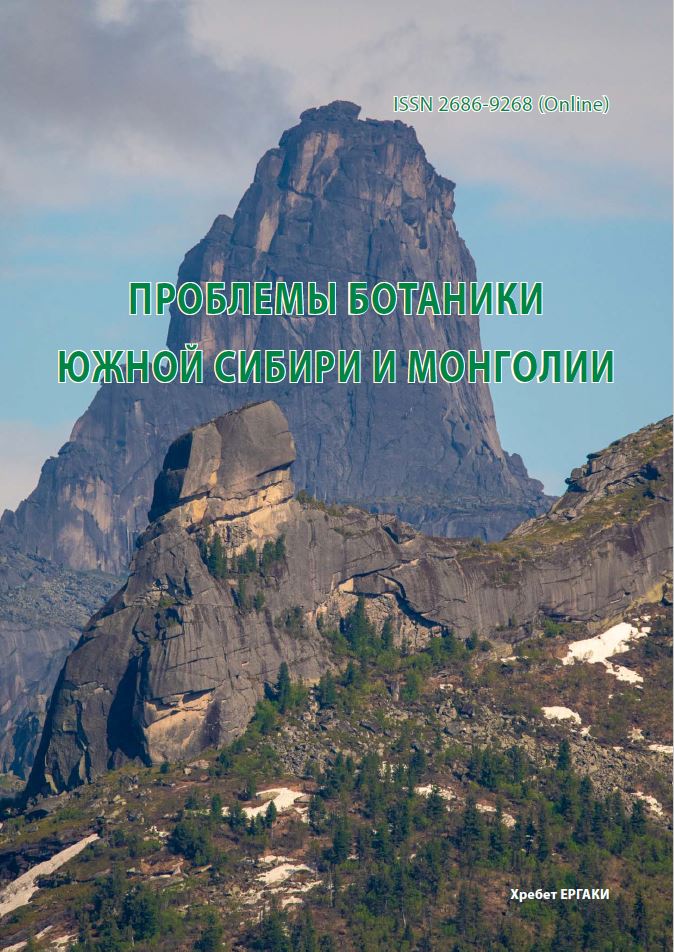Obtaining Glycyrrhiza uralensis “hairy” roots: primary assessment of growth characteristics and content of phenolic compounds
УДК 582.739:581.143.6:577.13
Abstract
Widespread use and uncontrolled harvesting of wild plants of Ural licorice (Glycyrrhiza uralensis Fisch. ex DC.) as a raw material for pharmacology and the food industry determines the promise of the system of “hairy” roots for obtaining valuable secondary metabolites. The aim of the research is to develop an effective protocol for the agrobacterial transformation of Rhizobium rhizogenes of various types of explants of 30-day-old G. uralensis microplants: cotyledons, primary shoots, hypocotyls, and primary roots. The effect of 100 цМ acetosyringone, variation of the cocultivation time (2 and 4 h) on the efficiency of the transformation process by two strains of R. rhizogenes 15834 SWISS and MSU 440 was studied. infection (2 h) and competent types of explants for transformation with the strain (cotyledons, primary shoots, primary roots). As a result of primary selection, 12 lines of stably growing BK cultures were selected. PCR analysis showed that all selected lines contain the rolB and rolC genes, while the virC gene is absent. It was determined that 4 lines are characterized by a high growth rate, 3 are characterized by a high total content of phenolic compounds. To the best of our knowledge, this is the first protocol for obtaining a culture of hairy roots from G. uralensis using strains R. rhizogenes 15834 SWISS and MSU 440.
Downloads
Metrics
References
Николаева Т. Н., Лапшин П. В., Загоскина Н. В. Метод определения суммарного содержания фенольных соединений в растительных экстрактах с реактивом Фолина-Дениса и реактивом Фолина-Чокальтеу: модификация и сравнение // Химия растительного сырья, 2021. - № 2. - С. 291-299. DOI: 10.14258/jcprm.2021028250
Носов А. М. Использование клеточных технологий для промышленного получения биологически активных веществ растительного происхождения // Биотехнология, 2010. - Т. 5. - С. 8-28.
Попова О. А., Ткачук Т. Е. Glycyrrhiza uralensis // Красная книга Забайкальского края. - Новосибирск, ООО «Дом мира», 2017. - С. 129-130.
Решетников В. Н., Спиридович Е. В., Носов А. М. Биотехнология растений и перспективы ее развития // Физиология растений и генетика, 2014. - Т. 46, №1. - С. 3-18.
Asl M. N., Hosseinzadeh H. Review of pharmacological effects of Glycyrrhiza sp. and its bioactive compounds //Phytother. Res., 2008. - Vol. 22. - P. 709-724. DOI: 10.1002/ptr.2362
Chandra S., Chandra R. Engineering secondary metabolite production in hairy roots // Phytochem. Rev., 2011. -Vol. 10. - P. 371-395. DOI: 10.1007/s11101-011-9210-8
Hussain M. S., Fareed S., Ansari S., Rahman M. A., Ahmad I. Z., Saeed M. Current approaches toward production of secondary plant metabolites // Pharm Bioallied Sci., 2012. - Vol. 4(1). - P. 10-20. DOI: 10.4103/0975-7406.92725. PMID: 22368394; PMCID: PMC3283951.
Jiang L., Akram W., Luo B., Hu S., Faruque M. O., Ahmad S., Yasin N. A., Khan W. U., Ahmad A., Shikov A. N., Chen J., Hu X. Metabolomic and Pharmacologic Insights of Aerial and Underground Parts of Glycyrrhiza uralensis Fisch. ex DC. for Maximum Utilization of Medicinal Resources // Front. Pharmacol., 2021. - Vol. 12. - 658670. DOI: 10.3389/ fphar.2021.658670
Khanuja S. P., Shasany A. K., Darokar M. et al. Rapid Isolation of DNA from Dry and Fresh Samples of Plants Producing Large Amounts of Secondary Metabolites and Essential Oils // Plant Molecular Biology Reporter, 1999. -Vol. 17. - P. 4. DOI: 10.1023/A:1007528101452.
Murashige T., Skoog F. A Revised Medium for Rapid Growth and Bio Assays with Tobacco Tissue Cultures // Plant Physiology, 1962. - Vol. 15. - P. 473-497. DOI: 10.1111/j.1399-3054.1962.tb08052.x
Ross I. A. Medicinal plants of the world: Volume 3 Chemical constituents, traditional and modern medicinal uses // Humana Press Inc., New Jersey, 2005. - P. 623. DOI: 10.1016/j.phytochem.2005.11.029
Van de Velde W., Karimi M., Den Herder G.,Van Montagu M., Holsters M., Goormachtig S. Agrobacterium rhizogenes - mediated transformation of plants // Genetic Transformation of Plants / J. F. Jackson, H. F. Linskens (eds.). -Berlin-Heidelberg: Springer, 2003. - P. 23-44. DOI: 10.1007/978-3-662-07424-4_2
VerpoorteR., ContinA.,MemelinkJ. Biotechnology for the production ofplant secondary metabolites // Phytochemistry Reviews, 2002. - P. 13-25. DOI: 10.1023/A:1015871916833
Wang L., Zhang K., Han S., Zhang L., Bai H., Bao F., Zeng Y., Wang J., Du H., Liu Y., Yang Z. Constituents Isolated from the Leaves of Glycyrrhiza uralansis and Their Anti-Inflammatory Activities on LPS-Induced RAW264.7 Cells // Molecules, 2019. - Vol. 24. - P. 1923. DOI: 10.3390/molecules24101923



